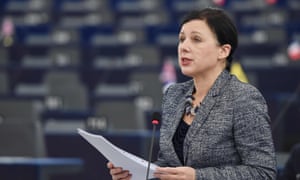Brussels has raised the alarm about the stagnant gender pay gap across Europe, as new figures showed that workplace culture and pay are deterring fathers in the UK from taking parental leave.
The European commissioner in charge of equality, Vĕra Jourová, said she was disappointed the gap between male and female earnings was stagnating across the EU, despite efforts by Brussels to change behaviour in member states and companies.
“Women’s capacities are not used in full,” Jourová said. “The member states are losing several percent of GDP, so this has not only a fairness angle, but also a pragmatic economic angle.”
She was speaking ahead of Equal Pay Day on 3 November, the moment when the European commission says women “stop getting paid” in comparison with their male colleagues. Jourová said the day falls even earlier in the UK, which has one of the worst gender pay gaps in the EU.
The gender pay gap – the difference between average gross hourly earnings of male and female employees expressed as a percentage – was 21% in the UK in 2016, compared with 16.2% in the EU as a whole, according to Eurostat. Only Estonia, the Czech Republic and Germany had a wider gap than the UK. The figures have changed little since 2008.
The European commission is urging legislators to reach a deal on a law that would set minimum standards on parental leave and carers’ rights.
The UK already meets or exceeds some of the EU standards proposed in a work-life balance directive that is being negotiated by MEPs. Shared parental leave was introduced in Britain in 2015, allowing parents to share 50 weeks of leave and 27 weeks of pay, but take-up could be as low as 2%.
New fathers in the UK are eligible for two weeks of paternity leave, but only 22% of fathers use it, according to a Eurobarometer study to be released on Friday. The survey also shows that half of British fathers would take parental leave if compensation levels were higher, and 38% felt they needed support from bosses and colleagues to take the time.
The commissioner said she was campaigning for member states to do more to promote parental leave, a tacit acknowledgment of the limits of EU lawmaking in the sensitive area of social policy. “It is mainly for the member states to sell these new opportunities to the fathers,” she said.
The work-life balance directive, proposed by the commission in 2017, called for the introduction of 10 days’ paid paternity leave across the EU, five days’ leave for carers, and the right to request flexible working. The proposals are likely to be watered down in final negotiations between European ministers and MEPs.
Some of the gender pay gap was explained by a failure to enforce existing legislation on equal pay, the commissioner said. “It is discrimination, it is the same work and different pay … It is obvious that there is not sufficient enforcement.”
She backs moves to compel large companies and public sector bodies to publish their gender pay gap, a measure that was introduced in the UK in April and only exists in a handful of EU countries.
The commissioner insisted she was not abandoning long-stalled plans for a 40% quota of women on company boards.
Source: Read Full Article
